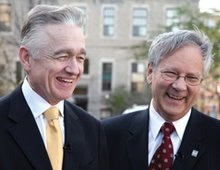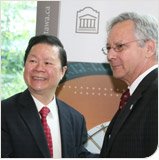The Ontario Civil Liberties Association (OCLA) has moved to intervene in the application for leave to appeal to the Supreme Court of Canada of appellant Denis Rancourt, regarding an unresolved judicial bias complaint that is advanced as grounds to overturn a Court of Appeal for Ontario decision to dimiss Rancourt's appeal from a lower court motion to end a defamation action against Rancourt on the grounds of maintenance and champerty.
The OCLA has posted all the court documents about its motion to intervene (OCLA's motion, St. Lewis response, U of O response, Rancourt response, and OCLA's reply): HERE-LINK.
At one point in argument, counsel for St. Lewis, Mr. Richard Dearden, rejects OCLA's intervention on the basis that:
"It is submitted that any organization that subscribes to Founding Principles that support hate speech and expression about child pornography, genocide and slavery utterly fails to 'represent the broad interests of citizens' in Canada." [at paragraph 19 of St. Lewis's response]
The Founding principles of OCLA are HERE, and are in evidence before the Supreme Court.
Iconic public intellectual Noam Chomsky, on reading the founding principles, endorsed OCLA as:
“I am very pleased to learn of the Ontario Civil Liberties Association, and wish it the greatest success in its work, which could not be more timely and urgent as elementary civil rights, including freedom of speech, are under attack in much of the world, not excluding the more free and democratic societies.”
It appears that Mr. Dearden is stating, inter alia, that a civil liberties association that supports free expression on all topics, including taboo and sensitive topics, cannot possibly represent the broad interests of Canadians? Mr. Dearden often acts for clients defending freedom of the press.
***
All other posts about the application for leave to appeal to the Supreme Court of Canada are: HERE, and HERE.
The summary of the application for leave to appeal is:
An Ontario superior court judge had strong personal, family, emotional, and contractual financial ties to a party intervening for the plaintiff in [the] case, and also to the law firm representing the party in court, and did not disclose any of these ties. This party was also the employer of the plaintiff in the lawsuit, and funded the plaintiff’s litigation. The judge was tasked with determining the propriety of the party’s funding of the plaintiff, which was done with public money. The judge’s ties made it inconceivable that he would rule against the party. When the defendant discovered the judge’s ties and presented the evidence, the judge lost decorum, threatened the defendant with contempt of court, and recused himself, but refused to consider whether there was an appearance of bias, and continued to release decisions. The judge’s in-court reaction and walkout further confirmed his ties with the party in the lawsuit. The defendant raised the matter with six more judges, up to the court of appeal [for Ontario], but all of them refused to duly consider and properly apply the facts. As a result, all the decisions of the judge in the lawsuit stand to this day, even the decisions he released after recusing himself.
--Summary, Memorandum of Argument, Application Book, page-34





